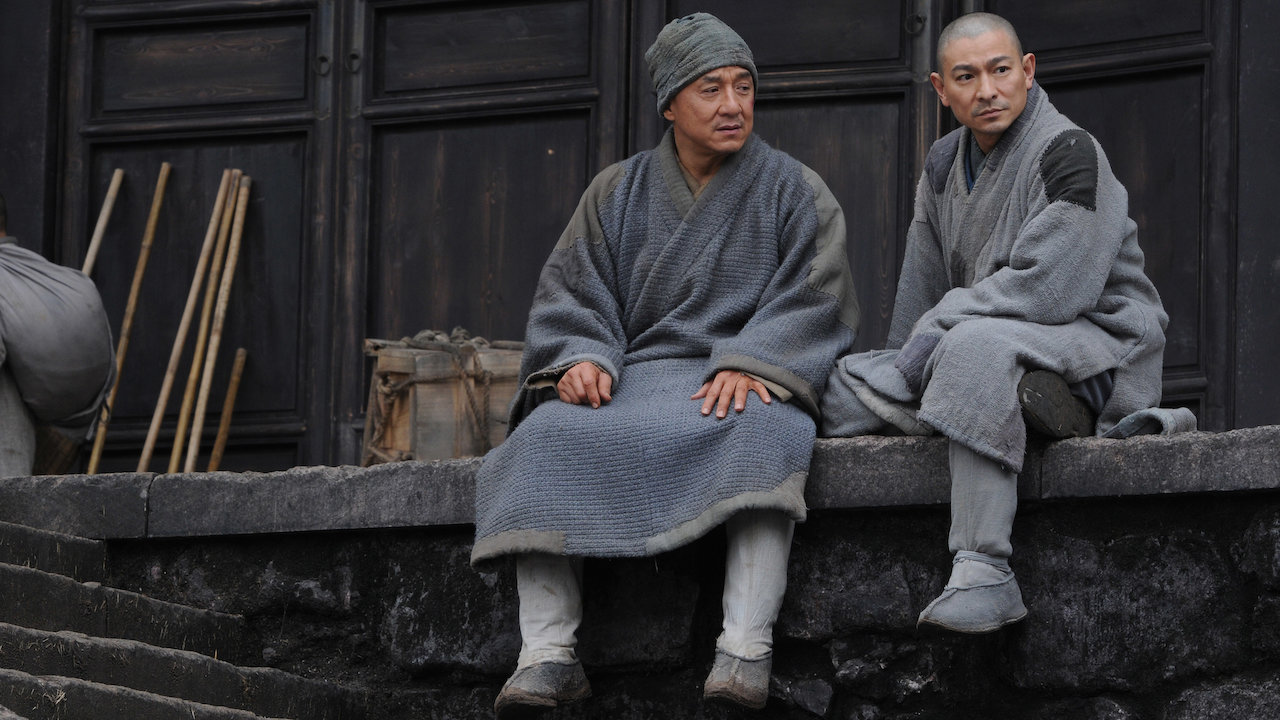By Chlotrudis Independent Film Society
Rating: 3.5 cats
Director: Benny Chan
Starring: Andy Lau | Bing Bai | Bingbing Fan | Jackie Chan | Nicholas Tse | Yu Xing

Country: china, hong_kong
Year: 2011
Running time: 131
IMDB: http://www.imdb.com/title/tt1533749/
Jason says: “Benny Chan’s SHAOLIN is not a remake of any of the Shaw Brothers films that focused on that legendary temple and its monks (though only fifty-odd years gone at the time, Gordon Liu-starring movies like THE 36TH CHAMBER OF SHAOLIN helped to cement its myth). It touches on the same sort of themes – finding inner peace through martial prowess
and ultimately standing up against a vicious warlord – but is its own sort of epic.
“In this one, the Shaolin temple does not stand aloof from the needs of the nearby people, but opens its doors to aid the refugees left homeless and injured by the war constantly waging around them. As one battle ends, they are confronted by General Hou Chieh (Andy Lau) and his second-in-command Tsau Man (Nicholas Tse), and Hou, shall we say, does not acquit himself admirably. Hou’s scheming will soon find itself repaid in kind, though, as he and his wife (Fan Bingbing) find themselves targets at a dinner where he’d planned to eliminate a fellow general. Injured and broken, he is forced to seek sanctuary in the temple, where only Wudao (Jackie Chan), the cook, will have anything to do with him. Meanwhile, a group of younger monks sneak out of the temple to steal food and medicine, and Tsau starts conducting business with western arms dealers.
“Benny Chan has been a prolific director in Hong Kong for a long time, although he never gained the same fame outside the area as John Woo, Tsui Hark, or even Corey Yuen. Here, though, he presides over a grand spectacle with elaborate action sequences and an operatic plot. and in some ways he seems a curious choice: Many of the big-budget historical action epics that make their way to the US from China are made by respected directors like Zhang Yimou taking a stab at making a blockbuster, rather than genre workhorses like Chan being given a chance to ‘elevate’ their work. This, perhaps, gives Shaolin a slightly different feel from many of its brethren; an unabashedly pulpy atmosphere amid the theatrics. Chan’s characters harness or plow through their suffering rather than relish it, and fights are exciting rather than beautiful.
“And the action is impressive, in large part because the casting department has stashed some pretty good screen fighters throughout the cast. Jackie Chan is there, obviously, but he doesn’t show up until the audience is fairly deep into the movie – and even then, the filmmakers have some fun flipping a genre trope on its head, getting laughs out of Wudao protesting that he doesn’t know kung fu and getting through his big fight scene by the younger monks calling out cooking actions. It’s a pretty clever way to give the older Chan a mentor character in a serious movie and still let him do the brand of physical comedy where he excels, actually. But the younger monks shoulder some of the burden where action is concerned, and they count Xin Xin Xiong (‘Clubfoot’ from the ONCE UPON A TIME IN CHINA sequels) and potential star Wu Jing among their ranks, and Andy Lau handles himself pretty well.
“Lau’s not just there to punch and kick people, of course, or even primarily for that. His job is to make Hou Chieh kind of a
bastard in the beginning and make the audience believe in his redemption by the end, and it’s a task he’s up to. The Hou who
starts to movie is a cocky son of a bitch, but not a sneering cartoon; as much as he’s carried away with his ambition and paranoia, there is in fact an adult underneath it. It makes the humbled Hou easier to accept, as we can see that the improved attitude came from somewhere. Nicholas Tse, after playing Tsau as the loyal officer in the opening, does not go for that sort of nuance – I thought a different actor and character had appeared when he shows up after the restaurant ambush, complete with newly-menacing facial hair and flamboyant outfits.
“Despite some impressive action and Tse’s frantic emoting in the second half, Shaolin does tend to fade as it goes on. The intrigue of the start gives way to relatively simple extremes of good and evil, with little sparks of wit like the disapproving look the Hous give as a rival tries to arrange a marriage between the Hou’s very young daughter and his similarly-aged son or the banter between the Robin Hood monks disappearing as the movie goes on. By the time the Evil White Guys show up (and I swear, their leader’s entire career has been playing Evil White Guys in Chinese movies) with plans that are too vague to be called truly evil until the very end, it’s as if the half-dozen writers couldn’t figure out a plot to go along with the historical backdrop and the redemption character arc. The finale winds up being muted as well, despite being one of the film’s most grandiose moments of destruction.
“That’s far from a total loss – Shaolin has an early but high peak, and can’t really be accused of overstaying its welcome. In some ways, despite its relative length, there’s just not enough; there’s enough good stuff that some bits could use room to breathe. 3 1/2 cats
“Seen 2 July 2011 at Lincoln Center’s Walter Reade Theater (New York Asian Film Festival 2011)”
